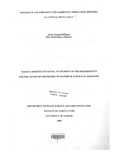Abundance and efficiency of garden pea nodulating rhizobia in central Kenya soils
Abstract
Garden pea is an important foreign exchange earner in the Kenyan economy and an excellent
source of dietary proteins for its people. Its production is limited by the low soil nitrogen in
major pea producing areas of Central Kenya. The high costs and the environmental concern
over the use of nitrogen fertilizer prompted the need for the study. A field experiment was
conducted at the University of Nairobi, Upper Kabete Campus Field station in the long and
short rains seasons of 2007, to determine the effects of rhizobia inoculation and nitrogen
fertilizer application on nodulation, growth and yield of garden pea. Response of pea to
rhizobia inoculation is attained in soil with inefficient or low population of indigenous strains
of rhizobia. A greenhouse experiment at the same site was therefore conducted in January
2008 to determine the abundance and efficiency of native garden pea nodulating rhizobia in
Central Kenya soils.
In the field experiment, two garden pea varieties, Plum and Ambassador, were tested. Each
variety was either inoculated with a commercial strain of rhizobia or supplied with 30 or 60
kg N ha', and a control that had no treatment applied. In the greenhouse experiment, Pisum
sativum cv Plum was used as the test legume. Soil samples were collected from 26 different
sites in five garden pea growing areas of Central Kenya, and then subjected to a laboratory
analysis. Each of the soils sampled then received the following treatments: 60 kg N ha',
inoculation with a commercial strain of rhizobia and a control that had no treatment applied.
In both experiments, treatments were laid out in a randomized complete block design
(RCBD) with a factorial arrangement. Nodule numbers, nodule weights, biomass
accumulated and yield of garden pea were determined.
XIV
In the field experiment, rhizobia inoculation enhanced pea emergence, nodule numbers,
nodule dry mass and shoot dry matter. Variety Plum had more nodule numbers and weight
compared to Ambassador when inoculated. Application of nitrogen fertilizer enhanced above
ground biomass accumulated and photosynthetically active radiation (PAR) interception in
garden pea. Plots supplied with 60 kg N ha' intercepted 18.7 % more PAR compared to the
control. There was an interaction between variety Ambassador and 30 kg N ha" in increasing
nodule numbers. Rhizobia inoculation and nitrogen fertilizer did not increase total fresh pod
and seed yields of garden pea. Nodulation was depressed in the short rains compared to the
long rains, due to moisture stress.
In the greenhouse experiment, rhizobia inoculation enhanced nodule numbers, nodule weight
and shoot biomass in some sites that had no history of cultivation. Some sites that had history
of pea cultivation responded to inoculation possibly due to inefficiency of native rhizobia in
nitrogen fixation. Sites that had low pH in Nyeri and Kabete responded the least to
inoculation. Application of 60 kg N ha" depressed nodule formation in garden pea growing
in soils from all sites. The numbers of active nodules in pea growing in untreated soil were
high, and it translated into increased biomass accumulation.
It was concluded that rhizobia inoculation and nitrogen fertilizer enhanced growth and
nodulation but not yield of garden pea in Kabete soil. H-i-gh-rates of nitrogen fertilizer were
found to depress nodule formation. It was also concluded that native garden pea rhizobia in
Central Kenya soils are abundant and efficient in nitrogen fixation. It was therefore
recommended that: a similar experiment involving several pea cultivars and a range of
commercial strains of rhizobia be conducted. There is need to carry out a study to determine
the effect of inoculation and liming on pea production in low pH soils.
Citation
Master of Science in Agronomy,Publisher
University of Nairobi Department of plant science and crop protection

